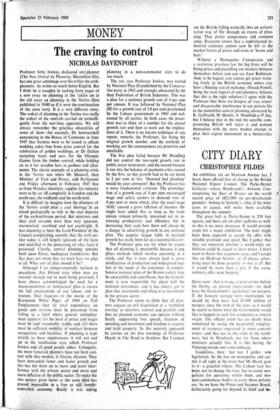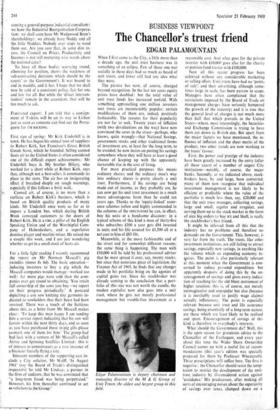CITY DIARY
CHRISTOPHER FILDES
An exhibition site on Madison Avenue has, I learn, been offered free of charge to the British National Export Council. The Parke-Bernet Galleries—where Rembrandt's Aristotle Con- templating the Bust of Homer set the world record price of £821,000 (in pre-devaluation pounds)—belong to Sotheby's, who, if the nrwc cares to accept, will make them available throughout the summer.
The great hall at Parke-Bernet is 250 feet square, and there are six other galleries as well; so this is no mere showcase. It would provide scope for a major exhibition. The BNEC might have been expected to accept the offer with suitable gratitude and speed. But I gather that they are uncertain whether a worth-while ex- hibition could be staged at short notice. I don't want to throw that argument away, and I accept that on Madison Avenue, of all places, adver- tising must be done properly or not at all. But it would be more than a pity if this extra- ordinary offer went begging.
Quite soon—that is to say, a week or two before the Derby, on present expectations—we shall -have the Government's 'guidelines' on mergers. If the January average were maintained, we should by then have had £3,400 million of mergers since the turn of the year, so it would be useful to know what. the Government would like to happen to such few companies as remain virgin. The official mind has no doubt been stimulated by seeing the purposeful redeploy- ment of resources expressed in more concrete terms—and that not in the wilds of the north- west, but in Woolwich, not far from where ministers actually live. It is like having the 'Vietcong invade one's own embassy.
Guidelines, then : but not, I gather, new legislation. So the law on monopolies and car- tels is all right in the form that Mr Heath gave to it—a graceful tribute. The Labour tack has been, not to change the laws, but to create new policies for operating within them, and new semi-autonomous bodies to carry those policies out. So we have the Prices and Incomes Board, deliberately going far beyond its' brief and be-
coming a general-purpose industrial consultant : we have the Industrial Reorganisation Corpora- tion: we shall soon have Mr Wedgwood Benn's shareholdings: we already have Neddy and all the little Neddies. Nobody ever stops to weed them out. Are you sure that, in some dim re- cess, the Council on Prices, Productivity and Incomes is not still muttering wise words about the national cake?
To have all these bodies scurrying round, elbowing for position, shows the weakness of sub-contracting decisions which should be the courts' or the Government's. It was bound to end in muddle, and it has. I hope that we shall now be told of a consistent policy, fair for one and fair for all. But while the 'direct interven- tionists' remain in the ascendant, that will be too much to ask.
Frustrated export: I am told that a consign- ment of T-shirts will be on its way to Lisbon just as soon as someone can find out the Portu- guese for I'M BACKING.
First sign of spring: Mr Kirk Underhill is in town. He has begun his annual tour of suppliers to Robert Kirk, San Francisco's Great British Goods Store, which he founded. Selling canned Scots air to the United States is often considered one of the difficult export achievements: Mr Underhill buys it. My brother Hilary, who worked for a short while at Robert Kirk, says that, although not a best-seller, it commands its place in the store. The air has an invigorating effect if breathed deeply on rough mornings, especially if this follows a brisk walk.
Canned air, of course, is no more than a curlicue on Robert Kirk's business, which is based on British quality products of many kinds. Mr Underhill once went so far as to import a London bus, which during British Week conveyed customers to the doors of Robert Kirk. He is a CBE, a pillar of the English Speaking Union and of the Worshipful Com- pany of Haberdashers, and a superlative domino player and martini mixer. He mixed me a couple this week, and I am just wondering Whether to get in a small stock of Scots air.
For a little light reading I warmly recommend
the report on Mr Norman Mascall's pig Swindles (Hmso 8s 6d). The basic operation—
inducing investors to buy a pig which the
Mascall companies would manage—worked too well: far more pigs were sold than the com- panies ever got round to obtaining. 'You retain full ownership of the sows you buy—we report on their progress periodically.' A postcard depiciting a coy sow knitting tiny garments in- dicated to sowholders that their beast had been serviced. There was a touch of the fictitious about this, as a letter from Mr Mascall makes clear : 'To keep this man happy I am sending, him a service report indicating that his sow will farrow within the next thirty days, and as soon as you have purchased those in-pig gilts please earmark one of them for him.' The group had bad luck with a venture of Mr Mascall's called Airtoy and Spinning Satellites Limited : this is of interest to connoisseurs as a rare instance of a financier literally flying a kite.
Innocent members of the supporting cast in- clude a City solicitor, Mr Wolff. 'In August 1961' (say the Board of Trade's distinguished inspectots) 'he told Mr Lindsay, a partner in the firm of auditors, that he was convinced that "a long-term fraud was being perpetrated." However, his firm thereafter continued to act as solicitors to the Group.'



































 Previous page
Previous page